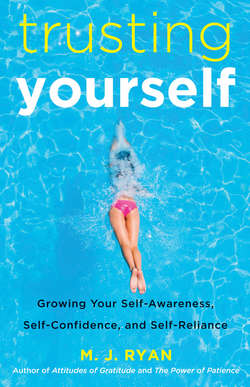Читать книгу Trusting Yourself - M. J. Ryan - Страница 10
На сайте Литреса книга снята с продажи.
The Promise of Trusting Ourselves
ОглавлениеTo know what you prefer instead of humbly saying “Amen” to what the world tells you that you ought to prefer, is to have kept your soul alive.
—Robert Louis Stevenson
Unlike the other virtues I have written about—kindness, gratitude, generosity, patience—self-trust is not something I went in conscious search of. Rather, like the rest of us, I was focused on my flaws and looking to be cured of what was wrong with me—my worrying, my fear of the future, my inability to be alone with my feelings. Therapy helped a lot—now I understood why I had the problems I did—but I still suffered from and with these issues.
Then I met a wise woman named Dawna Markova. She uses what she calls an asset-focused approach to life, which is about looking at what is right and strengthening that, rather than focusing on what's wrong. I have studied and worked with her for almost fifteen years now, and this approach is now virtually part of my DNA. I use it for myself, with family and friends, and with the executives with whom I am privileged to be a thinking partner. This book is my understanding of her approach as it applies to adult happiness and well-being, and many of the concepts and practices originated with her.
Looking back on what has happened to me over the past fifteen years, I see that I've really been on a journey of coming to more and more deeply trust myself. And with such trust, I am more peaceful, more joyful, more worry free. I'm more comfortable being with myself and by myself. I'm living more in alignment with what deeply matters to me, more able to make decisions for myself. I'm much less overwhelmed by life. And when it all does get to be too much, I know what I need to do to get back on track. It's also easier for me to accept others for who they are and not condemn their choices, values, or attitudes.
Trusting ourselves offers many other rewards. The one that's been most freeing for me is that I can stop trying to control life and instead place my faith in my capacity to respond to it.
What an immense relief! Rather than fretting over everything, we're able to move through life with confidence that we can handle whatever comes at us. Life is exciting rather than threatening because we know what we want to say yes to and do it often. We also know we have worthwhile gifts to offer others. So we reach out in delight to give what is ours to give, do what is ours to do.
Trusting ourselves also helps when we go through difficult inner times. We learn we can survive—depression, sorrow, a sense of meaninglessness—and we learn what helped us make it, so when hard times come again, we're better prepared. We aren't afraid to stop moving and just be with ourselves because we know ourselves to be a source of wisdom. Our feelings are no longer so threatening to us, and we are able to serve as guides and mentors to others who suffer.
I believe that the same rewards can happen for you when you make this inner shift. You'll know you trust yourself when you feel less tense and more positive, when you feel lightness in your daily circumstances, when you feel more accepting of yourself and others, when life is less drudgery and more joy filled. But don't take my word for it—try a few of the attitudes and practices in this book and see for yourself. It's your capacity to trust yourself that interests me, not your trusting me.
If there is a through line in my life, both personally and as a writer, it is to identify and develop those qualities that help us grow individually and collectively in wisdom and love. That's ultimately why I'm so interested in self-trust. “Wisdom,” Buddhist monk Khandro Rinpoche says, “is innate in us; it is not something that can be bought, heard, or received from the outside.” In other words, we must look within to find it. It can't come from anyone but us. Without self-trust, we can never become wise because we will continue to look outside ourselves for the answer. As for love, it is only when we are grounded in our own beingness, comfortable with who and what we are, that we can enter into a truly loving encounter with another human being. Otherwise we are using the other person to meet our needs for security or approval rather than entering fully into the soul-growing encounter that a real loving relationship promises.
Ultimately, the greatest rewards of trusting ourselves are to be found at the soul level, the place where we are called to discover and express the wholeness of who we are for the benefit of all. “A self is made, not given,” says author Barbara Myerhoff. “It is a creative and active process of attending a life that must be heard, shaped, seen, said aloud into the world, finally enacted, and woven into the lives of others.” We can't do that if we are looking outside ourselves for the answers. As that wise man Carl Jung once said, “He who looks outside dreams. He who looks inside wakes.”
This book is an invitation to look inside in a new way and awaken. Not to detail what is wrong, but to come to deeply treasure what is right. And to use what you discover to make your way more happily in life and to offer the gifts that only you can provide. For the more you trust yourselves, the more you will know just what your place in the grand design of life is and what your matchless contribution might be.
